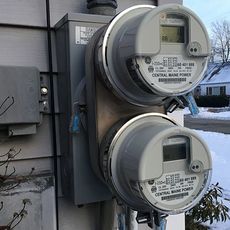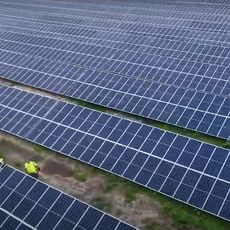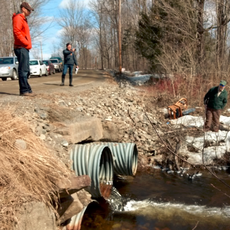Processing Your Payment
Please do not leave this page until complete. This can take a few moments.
- News
-
Editions
View Digital Editions
Biweekly Issues
- December 1, 2025
- Nov. 17, 2025
- November 03, 2025
- October 20, 2025
- October 6, 2025
- September 22, 2025
- + More
Special Editions
- Lists
- Viewpoints
-
Our Events
Event Info
Award Honorees
- Calendar
- Biz Marketplace
Energy & Utilities
-
Maine again gets C- on infrastructure 'report card,' but nearly flunks in some areas
Staff December 3, 2020The evaluation by an engineering group graded infrastructure in 16 categories. The report found bridges and roads lack funding for substantial improvements. But aviation infrastructure received the state's highest category grade of B.
Staff December 3, 2020Maine's climate plan focuses on building economy while tackling challenges
Maureen Milliken December 2, 2020The state's Maine Won't Wait climate action plan, unveiled Tuesday by Gov. Janet Mills, means doubling clean energy jobs and making sure economic growth and climate action align, an approach endorsed Tuesday by John Kerry, President-elect Biden's
Maureen Milliken December 2, 2020New president takes the helm at Versant Power
Staff December 1, 2020A 30-year veteran of the utility industry is succeeding Mike Herrin, who had previously announced he would leave the company at the end of 2020.
Staff December 1, 2020Fishery group pans loss of fishing ground in Mills offshore wind plan
Staff Updated: November 23, 2020Renewable energy solutions shouldn't be developed at the expense of fishermen, seafood providers and fishing communities, says one industry leader. The state last week issued a plan to create a 16-square-mile offshore wind research array in the Gulf
Staff Updated: November 23, 2020Central Maine Power again ranks worst in US for business customer satisfaction
William Hall November 19, 2020For the third year, the state's largest electric utility received the lowest score in a national study of business customers. In related news, the Public Utilities Commission announced lower rates for standard-offer service in 2021.
William Hall November 19, 2020Offshore wind developer solicits Maine participation in supply chain
Staff Updated: November 11, 2020The project is expected to produce more than $125 million in total economic activity and create hundreds of Maine-based jobs during the construction period.
Staff Updated: November 11, 2020Maine's clean energy boom will help offset COVID's economic toll, report predicts
Renee Cordes Updated: November 11, 2020A 43-page policy report, by the Governor’s Energy Office and Governor’s Office of Policy Innovation and the Future, explores the momentum within Maine’s clean energy economy.
Renee Cordes Updated: November 11, 2020CMP corridor project could begin construction in weeks, after getting Army Corps OK
William Hall November 5, 2020The planned 145-mile electricity transmission line through western Maine received a key federal approval after undergoing an environmental review. But opponents say that analysis wasn't stringent enough.
William Hall November 5, 2020Sanford solar development being sold to NY investment group in $300M deal
Staff November 3, 2020As it nears completion, the Sanford Airport Solar Energy Center is being sold as part of a portfolio that includes six other solar electricity generation sites across the country.
Staff November 3, 2020In latest salvo, CMP corridor foes launch a second referendum
Staff Updated: November 2, 2020An earlier citizens referendum might have blocked the proposed $1 billion electricity transmission corridor through western Maine. But the question never made it to this week's ballot. Now a group of opponents is back with another referendum try.
Staff Updated: November 2, 2020Electric co-op will expand connections with $9.5M loan
Staff October 27, 2020The consumer-owned Eastern Maine Electric Cooperative Inc., which serves parts of Aroostook, Penobscot and Washington counties, will use the USDA financing to improve power connections for hundreds of customers.
Staff October 27, 2020College of the Atlantic is No. 1 green college for fifth year running
Staff October 27, 2020Colby, Bowdoin and Bates also made the top-50 list, which recognizes factors such as regional foods, waste diversion, renewable energy and sustainability-focused academics.
Staff October 27, 2020Versant Power begins $5M rate relief effort for low-income customers
Renee Cordes October 27, 2020Versant Power, formerly Emera Maine, said Monday that it is beginning to distribute $5 million in relief to low-income customers in northern and eastern Maine.
Renee Cordes October 27, 2020Combined heat-and-power may be an energy market with promise in Maine
Laurie Schreiber Updated: October 26, 2020Maine and New England hit several criteria that promise good return on investment. But the market is hampered by lack of awareness, especially among smaller energy consumers.
Laurie Schreiber Updated: October 26, 2020140-year-old Old Town company names new president, its 8th ever
Staff October 9, 2020The James W. Sewall Co. tapped Charles Nadeau, previously COO and CFO, to succeed George N. Campbell Jr., who has been named chairman of Sewall's parent company in Yarmouth.
Staff October 9, 2020New bridges in Penobscot County part of Chevron oil discharge cleanup
Maureen Milliken October 8, 2020A settlement that followed decades of oil discharge from Chevron terminals in Hampden, first discovered in 2006, is aimed at environmental restoration in Penobscot and Hancock counties along the Penobscot River watershed.
Maureen Milliken October 8, 2020
Today's Poll
Sponsored by Kennebunk Savings Bank
Small Business Saturday, the annual tradition that encourages shoppers to support local, independent retailers and entrepreneurs, marked its 16th rendition on Nov. 29, with events held across the nation.
Founded by American Express in 2010, the yearly event has become an essential part of the holiday shopping season. The Small Business Administration became the official co-sponsor in 2011.
Last year, shoppers turned out in full force to support their local communities, generating an estimated $22 billion in spending at small retailers and restaurants.

The Giving Guide
The Giving Guide helps nonprofits have the opportunity to showcase and differentiate their organizations so that businesses better understand how they can contribute to a nonprofit’s mission and work.
Learn More
Work for ME
Work for ME is a workforce development tool to help Maine’s employers target Maine’s emerging workforce. Work for ME highlights each industry, its impact on Maine’s economy, the jobs available to entry-level workers, the training and education needed to get a career started.
Learn More
Groundbreaking Maine
Whether you’re a developer, financer, architect, or industry enthusiast, Groundbreaking Maine is crafted to be your go-to source for valuable insights in Maine’s real estate and construction community.
Learn more-
The Giving Guide
The Giving Guide helps nonprofits have the opportunity to showcase and differentiate their organizations so that businesses better understand how they can contribute to a nonprofit’s mission and work.
-
Work for ME
Work for ME is a workforce development tool to help Maine’s employers target Maine’s emerging workforce. Work for ME highlights each industry, its impact on Maine’s economy, the jobs available to entry-level workers, the training and education needed to get a career started.
-
Groundbreaking Maine
Whether you’re a developer, financer, architect, or industry enthusiast, Groundbreaking Maine is crafted to be your go-to source for valuable insights in Maine’s real estate and construction community.
ABOUT
NEW ENGLAND BUSINESS MEDIA SITES
No articles left
Get access now
In order to use this feature, we need some information from you. You can also login or register for a free account.
By clicking submit you are agreeing to our cookie usage and Privacy Policy
Already have an account? Login
Already have an account? Login
Want to create an account? Register
This website uses cookies to ensure you get the best experience on our website. Our privacy policy
To ensure the best experience on our website, articles cannot be read without allowing cookies. Please allow cookies to continue reading. Our privacy policy
















